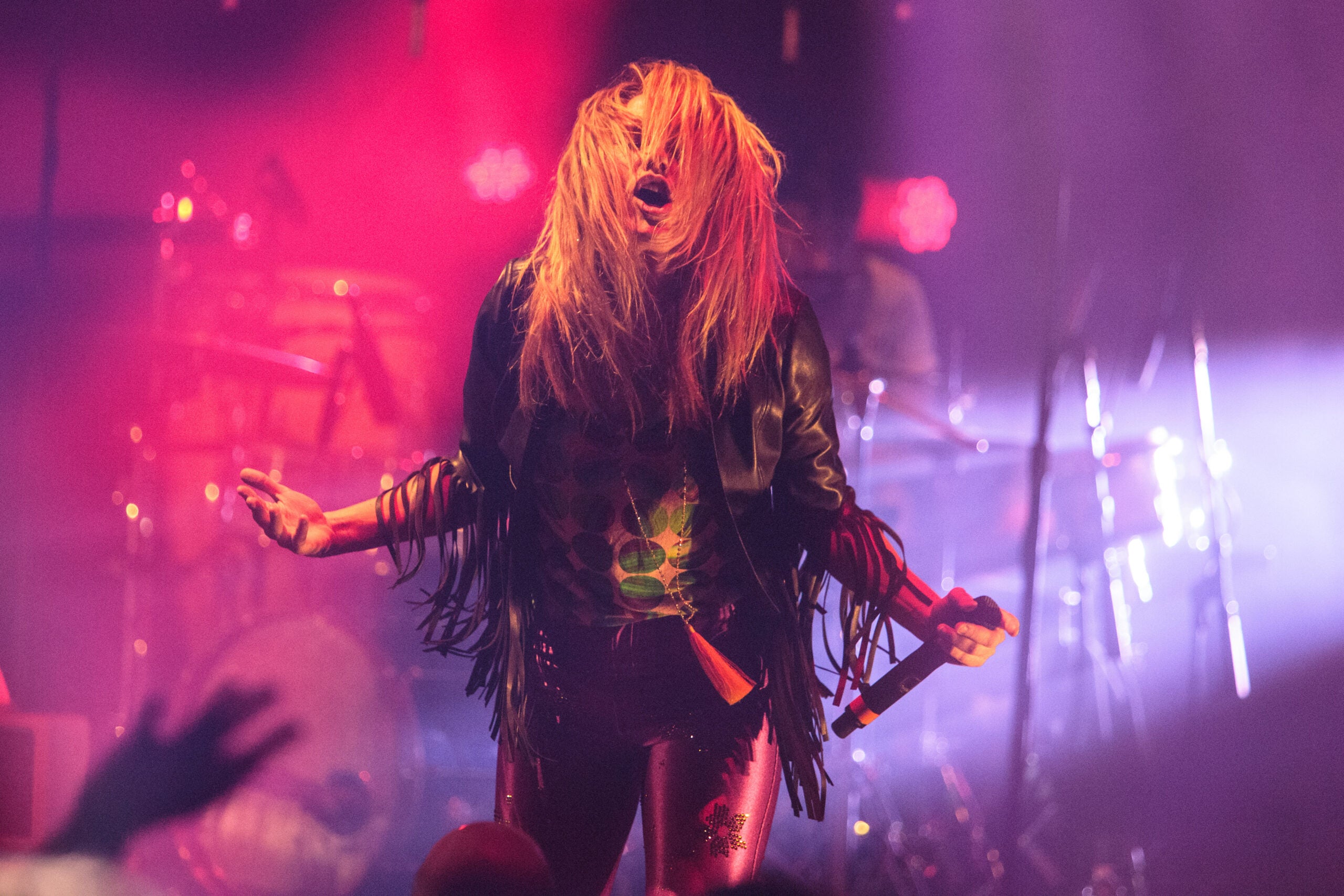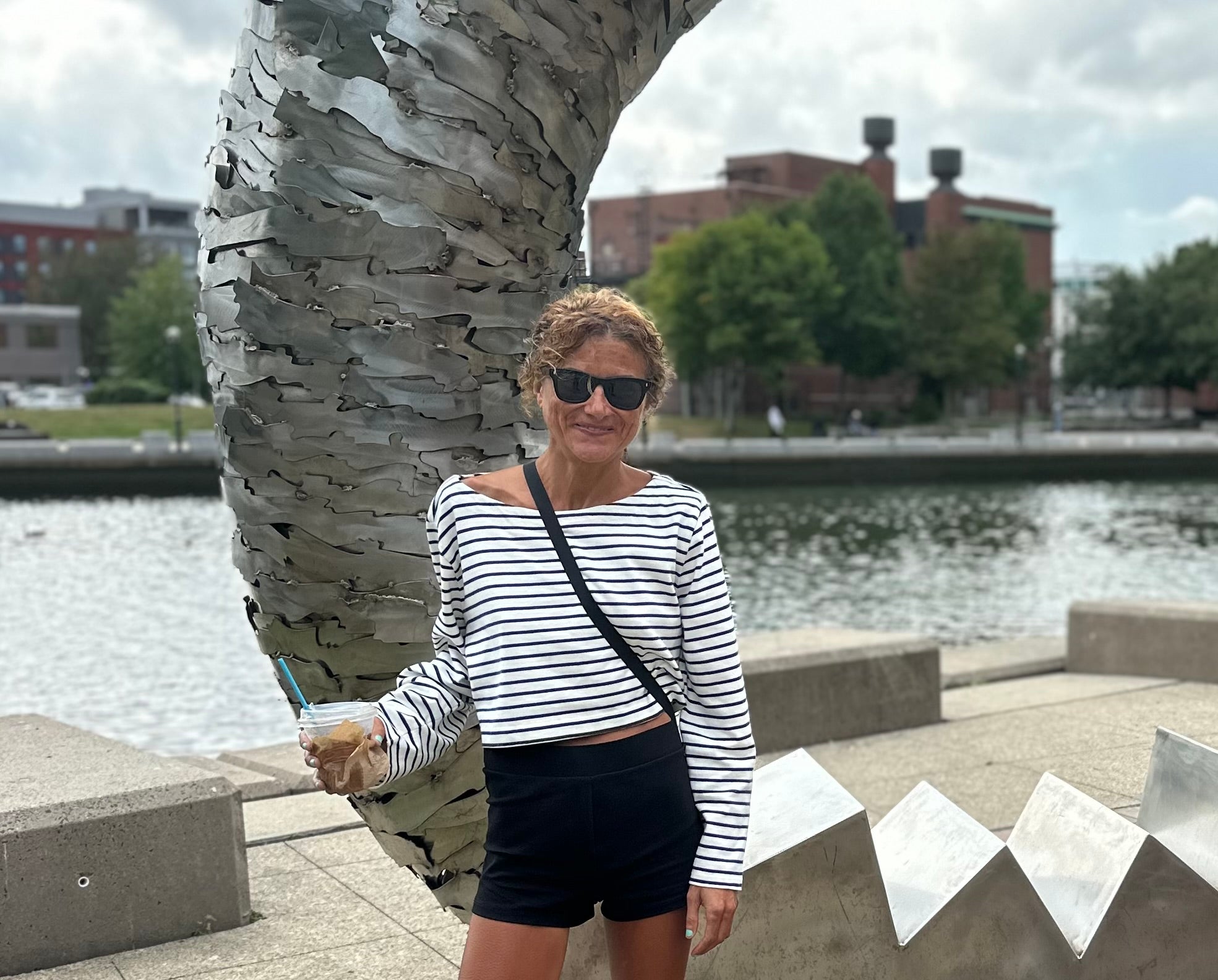Arts
Ahead of her Mill City show Thursday, the Vermonter and Nocturnals frontwoman talks wildfires, filmmaking ambitions, acid, AI, and playing the Sphere.
When I reach Grace Potter, she’s at her Fayston, Vermont farm, looking out onto a flooded field.
“The river decided to reroute itself through our field. The river was like, ‘We’re going to take this and turn it into a river, thank you very much,’” says Potter.
First came the flood. Then came the fire. Then the bomb scare.
“Disasters have been following me around — but so has the joy. When the sh— hits the fan, it depends on how you handle it. I do really well in totally desperate and strange situations. I think I’d be a good EMT.”
I’ll get to those disasters in a minute. First, the joy.
The Grammy nominee and Waitsfield, Vermont native has finally released her long-shelved album, “Medicine,” produced by legendary producer T Bone Burnett in 2008.
“Medicine” is at once uniquely Potter and distinctly Burnett. The Oscar and 13-time Grammy winner is known for his work with Willie Nelson, the Wallflowers, and Robert Plant & Alison Krauss, along with creating masterful soundtracks, from “The Big Lebowski,” to “O Brother, Where Art Thou?”
When a studio-soundscape painter like Burnett and outside-the-box-thinker/ power-singer like Potter join forces, the result is not song-of-the-summer FM bubblegum. It’s a five-course meal.
“The album doesn’t read like a billboard in Times Square. It’s like a really great New York Times piece that takes you two hours to get through,” Potter, 42, tells me in our recent phone interview from her Vermont home.
“I’ve always come across as this sort of barbarian-pirate-goddess-type rocker— but the intellectual journeys I go on when no one’s looking are interesting for people who have the patience to sit with me,” she tells me. “T Bone made it okay for me to intellectualize things. Then he turned that into a sound that felt like it was coming from the inside of my brain.”
The unearthed Burnett album has landed Potter everywhere from Variety to CBS Saturday Morning. Heck, she sang the national anthem at the Kentucky Derby. (“This has been the most fervent coverage I’ve ever had.”)
Yes, she’s got a lot going on. But for me, the joy of interviewing Potter is, well, Potter.
It’s not just her candor — from miscarrying twins, to a depression diagnosis, it’s all discussed openly for what it is: humans dealing with human stuff.
Really though, it’s her unique way of viewing the world, quotes she may even realize pop.
Example: When I ask about Goose playing her upcoming Grand Point North Fest:
“It’s fun, because I have a thing with G names. G is such a power-letter. I love V, I love G, I love M — certain letters seem like buildings on their own. G is the silliest because it can fall on his back and flail around like a ladybug.”
Or when she tells me she’s living in her barn because her farmhouse’s beams are haunted.
“Well, the house was picked up and moved onto a new foundation. Houses don’t like that,” she explains. “Listen, a little camper-trailer? A super eco-friendly house? Tiny homes? Yes. They’re built to do that. Those buildings know they’re supposed to do that. But this building was built in 1840-something.”
Potter is never not interesting. To quote Jack Kerouac, she burns burns burns like fabulous yellow roman candles.
As the Vermonter readies to play Kerouac’s hometown July 17 for the Lowell Summer Music Series, and host her Grand Point North Fest in September in Burlington, I called to discuss fleeing the LA wildfires, fleeing a bomb scene, rocking the Sphere with Kenny Chesney, haunted homes, film projects, dropping acid in her Vermont teenagehood, and more.

Boston.com: You’ve been through so much since we talked last year. You evacuated the LA wildfires, your farm was “devastated” by the Vermont flood, you were near the bomb that went off in New Orleans on New Year’s. That’s a lot.
Grace Potter: Honestly, in the chaos of moments like these, I get tunnel-vision. I get very clear. It actually reminds me of my center, even if that center is in the middle of a hurricane.
During the LA fires, you posted an Instagram story saying you expected to lose your Topanga house.
It didn’t burn. There were several propane tanks that — I mean, when we saw the footage, the fire was at our house. I accepted that we probably weren’t coming home to a house. But the firebreak was on our property line. They intentionally let it burn to the edge. They [cleared] a 30-foot-wide path — our property is that path. So now we have our house, and access to the Topanga State Park. Thank you so much, firefighters.
Wow, silver-lining. Your Vermont home was “devastated” by the flood last year.
For two years in a row. Last year, it flooded our basement which housed guitars, my wardrobe, all our records. Why were they in the basement? We were just dumb humans. We humans are far more fragile than we realize, and the most fragile part is our egos.
True. You had a traumatic New Year’s, too.
I was with my family and dog on a cross-country road trip. We decided on a whim to stop in New Orleans. We figured, “What a wild place to be for New Year’s Eve.”
My friend Bobby owns this amazing hotel on Bourbon and Toulouse. My husband Eric [Valentine] is Mr. Stay-Inside-Guy, but he got a wild hair, and was like, “Let’s go out to Bourbon Street!” It’s 1:30 a.m., he’s barefoot, we’re wandering directly on the corner where the explosion happened about two hours afterwards. I literally have a video of us at the spot where it happened.
Our room was one block away from where it happened. We woke up in the morning, people were texting us like crazy. We packed quickly, and scooted out before police shut down the French Quarter to detonate the other devices. It was only scary as we were driving away from New Orleans and reading the headlines and saw how close it was to us.
Wow. So to pivot here, you said there’s also joy following you. You unearthed your 2008 T Bone record and it sounds amazing. Tell me what happened. Why was it shelved?
That’s a great question. I still ask that question all the time. I think the heart of it was that classic Tom Petty line [sings from “Into the Great Wide Open”] “Their A&R man said ‘I don’t hear a single.’”
Right.
Radio was still a big presence at the time. The T Bone record had a timeless quality, this atmosphere, that unless you’re sitting down with the whole record, maybe it wouldn’t just grab people? I don’t know. I’m not a marketing expert. But it felt like I was a young, hot artist on the rise. Why put out a record that makes me sound like I’d been around for 30 years? I don’t know. I can’t speak for anybody at Hollywood Records.
How did you unearth it?
Oh, I just called them and said, “Hey, can we put out that record?”
[laughs] OK.
All the mayhem of my last five years, I think let me finally look backwards and not be afraid of the rearview mirror. I was always pretty confounded by my past: “What is this life I’m in? Did I choose any of this?” The funny answer is “No. But nobody gets to.” Free will is not the commanding officer we think it is.
I like that. So T Bone just seems so cool. When I interviewed him, he dropped these little profound nuggets of wisdom. He feels like a wise sage. What’s it like working with him?
Yes! He is the wise sage. It was like going to a master-class with someone who’s done this so many times yet still has reverence for the work. He honors the creative process. It fell in line with my creative process. He’d say stuff like: “This song really breathes.” Or there was one moment we all thought he was asleep on the couch, but he was actually listening with his eyes closed. [After the song] he said: “That was great. Now: You’re the Pink Panther.”
[laughs] Classic.
That’s the kind of trust fall I never thought was possible in the studio.
You told me last year you envisioned your album “Mother Road” becoming a feature film. What’s happening there?
So right now, I have two scripts. I have an agent, I have a producer. I don’t have a studio. Turns out, me entering into the film industry just now was kind of stupid, because it’s in the sh—er, big time. Big time!
[laughs] Right.
But — just like all the other chaos I seem to invite into my world — I think it’s a golden opportunity for me to bring back the collaboration of music and film. I don’t understand why there aren’t [original] soundtracks for movies anymore, like “Harold and Maude,” “The Graduate,” “Shaft.”
Dylan’s “Pat Garrett and Billy the Kid.” It does feel like a lost art.
So I arrived in the movie scene, only to find the movie scene is actually a small, broken world. But I can’t wait to come help fix it. They have underestimated me, man. I have seven more movies in my brain.
[laughs] You also founded Grand Point North music fest in Vermont. The 12th annual is coming up Sept. 12-14. You’ve also started the Grand Point North Foundation, a “nonprofit dedicated to supporting the arts in Vermont.”
I realized I’ve never been interested in making money at that festival. It’s about contributing back to the heartbeat of Vermont arts and culture. Vermont has so many creative people — writers, poets, inventors — but we all operate in a vacuum, everybody’s hiding out in the woods doing their own thing.
I want to create a network of connectivity and a sustainable future for artists and creators, because Vermont doesn’t have a lot of stages, or galleries, or performance halls, or festivals. I want to spend my time devoting myself to bread and circus — a pillar of society from Greek times until now, but it’s under-expressed outwardly in Vermont. I want to create a metaphorical train that links us all together.

You’re also coming to Lowell July 17.
I am so excited about Lowell because the director of my foundation is a Lowell native. And this is sort of the launch of my foundation. So we’ll come up with something super special for that night, to share a little bit of our journey with the world.
That’s awesome. So going back to your Vermont roots. You’ve told me before that, as a kid, you felt like you were adopted.
Yeah, I felt like my older sister filled the role of kid. She kidded like a motherf—r, man. She was a good student, very popular, really good at sports, really good grades — all the things I wasn’t.
My younger brother was born with epilepsy and nonverbal learning disorder. So a lot of energy was spent trying to diagnose and understand that, which led to a lot of trauma and difficulty that’s still part of our lives.
There’s something about being a middle kid. I’ve seen the memes of the [overlooked] middle kid. A lot of my life was just trying to get a word in edgewise. I acted out a lot. I misbehaved. I was a very bad student and very challenged. I got put into the resource room. I don’t actually know if I needed to be in the learning resource room or if I just wanted to be like my brother, that would get me more attention.
That’s an interesting insight.
My singing is what people started to notice. It led to me commodifying my musicality from a very early age. My high school years were very experimental. Took a lot of acid. I didn’t really like Phish, but I went to all the Phish concerts because that’s the only thing kids did in town.
[laughs] I can see that. You studied filmmaking for a stint in college before the Nocturnals took off. You clearly have a passion for it. You’ve got a “micro film” series on Instagram that’s so interesting, “The Wanderer.”
I love that you followed that! My brain lit up with that project. Somebody asked me if chat GPT had written them, because I use the word “delve,” and apparently that’s a chat GPT giveaway. I just like the word delve, sorry. It’s weird. It’s a wild ride.
I know. I hate that this is a thing now. It’s scary.
When I was born, there was no internet. I’ve never asked to be born into a world where I get handed this paper-thin thing that can rule the universe. I don’t remember requesting that when I was in the stardust. To be born into this time feels existentially confusing for me, hence “The Wanderer” series. That’s what that is: She gets dropped into a planet that she doesn’t know or understand.
I’m the same age as you. We’re the last generation to remember analog days. By the time we left high school, it was a new world.
Yes! It moves so fast. We’re just taking it as it comes. Humans are incredibly adaptable. I’m sure from your years of writing, you know how you’re writing one story and then suddenly you’re handed a completely different lead than the direction you thought you were going, and you said, “I’m pivoting.”
We don’t have any control over this situation, but we can respond with agility. I think we’re both trained ballerinas.
That’s a beautiful metaphor. So I have to ask: What was it like playing the Sphere with Kenny Chesney?
Oh, my God, okay. First of all, I invited myself.
[laughs]
Second, he’s one of my best friends, so we weren’t even working. Beyond that, I went to Vegas, hung out all day, got to go on stage and be adored, then go do whatever I wanted in Vegas. It was f—ing great. [laughs]
And questions of technology come into play. I don’t know if I’m scared of it, or if I love it. I can’t tell. But it’s changing the landscape of live music. Every artist who goes there has to totally rethink their show. It’s overwhelming.
Another technological pivot.
I had a crazy dream when the Sphere first came about that I did it with the Flaming Lips. I texted Wayne [Coyne] about it. “Wayne! Let’s turn it into a womb. It’ll be called the Flaming Womb of the Mother Road. You’ll come sailing in a rocket ship.”
Lauren Daley is a freelance culture writer and regular Boston.com contributor. She can be reached at [email protected]. She tweets @laurendaley1, and Instagrams at @laurendaley1. Read more stories on Facebook here.
Sign up for the Today newsletter
Get everything you need to know to start your day, delivered right to your inbox every morning.

